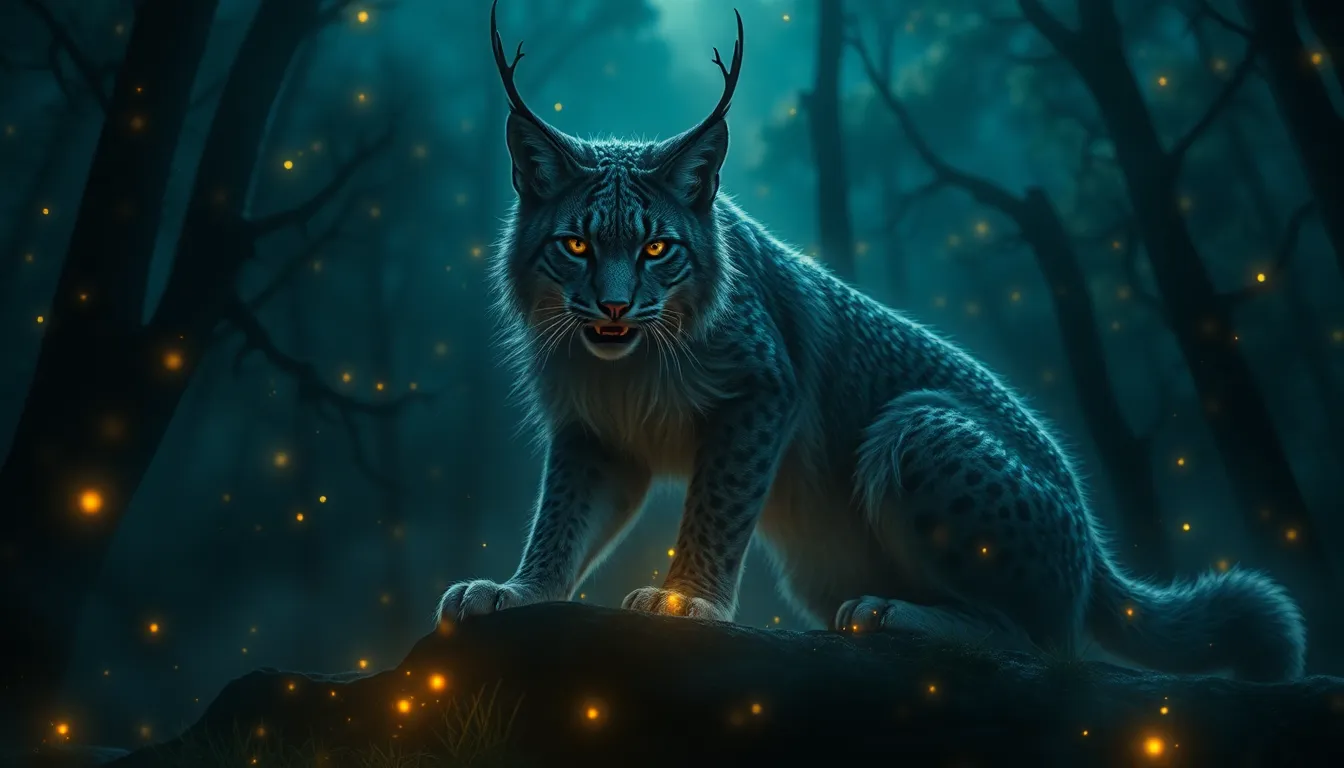The Sacred Lynx: Secrets of the Night in Myths
Introduction to the Lynx: A Mysterious Night Hunter
The lynx, a captivating feline known for its tufted ears and keen eyesight, is a master of stealth and nocturnal hunting. These elusive creatures inhabit various regions, including the dense forests of Europe, Asia, and North America, where they thrive in cold environments characterized by coniferous trees and vast wilderness. With their solitary nature and remarkable hunting skills, lynxes have become symbols of mystery and intrigue in various cultures throughout history.
In many indigenous cultures, the lynx is revered as a creature of significance, embodying wisdom and the unseen mysteries of the natural world. Its ability to navigate the night and remain hidden speaks to a deeper understanding of the world that transcends mere survival.
The Lynx in Ancient Mythology: A Symbol of Wisdom and Perception
The lynx has played an important role in ancient mythologies, particularly in Greek and Roman traditions. In these cultures, the lynx was often associated with the goddess of wisdom, Athena, reflecting its reputation for keen perception and insight.
- Greek Mythology: The lynx was believed to possess the ability to see through the darkness, symbolizing a higher level of awareness and foresight.
- Roman Mythology: The Romans regarded the lynx as a creature capable of seeing the truth hidden in shadows, often linking it with themes of justice and clarity.
This association with clairvoyance has led the lynx to be recognized as a symbol of wisdom, guiding individuals toward deeper understanding and enlightenment.
Celtic Legends: The Lynx as a Guardian of the Forest
In Celtic folklore, the lynx is often portrayed as a guardian spirit of the forest, embodying protection and secrecy. These legends highlight the lynx’s role in maintaining the balance of nature and safeguarding its hidden treasures.
- Protector of the Wild: The lynx is seen as a keeper of forest secrets, ensuring that the natural order is preserved.
- Symbol of Insight: In Celtic mythology, the lynx’s ability to navigate the dark woods represents a deeper understanding of life’s mysteries.
These stories emphasize the lynx’s importance in Celtic culture as a creature that connects humanity with the natural world and its unseen wonders.
The Lynx in Indigenous Cultures: Spirituality and Connection to Nature
Among various Native American tribes, the lynx is revered as a spiritual being that embodies the essence of nature and the importance of living in harmony with the environment. Its presence in stories and teachings emphasizes balance and respect for the natural world.
- Spiritual Significance: The lynx is often seen as a guide or teacher, imparting wisdom about the interconnectedness of all living things.
- Lessons of Balance: Lynx stories highlight the need for respect toward nature, fostering a sense of responsibility for the environment.
These narratives serve as reminders of the importance of maintaining balance within ecosystems and recognizing the sacredness of all creatures.
The Lynx and Night: The Enigma of Nocturnal Behavior
The lynx is uniquely adapted to thrive in the dark, employing specialized senses and physical traits that enhance its nocturnal hunting capabilities. With excellent night vision and silent movement, the lynx is a formidable predator.
- Adaptations for Night Hunting: The lynx has large pupils that allow it to see well in low light, combined with powerful legs for swift movement through snow.
- Myths Surrounding Nocturnal Prowess: Many cultures have woven tales around the lynx’s ability to hunt in darkness, often attributing supernatural qualities to its skills.
These adaptations and myths contribute to the lynx’s enigmatic reputation, reinforcing its status as a mysterious and powerful creature of the night.
Folklore and the Lynx: Tales of Transformation and Change
In various folklore traditions, the lynx often represents transformation, serving as a guide during significant changes in characters’ lives. These stories illustrate the lynx’s role as a catalyst for personal growth and enlightenment.
- Guides in Transformation: The lynx frequently appears in tales where it helps characters navigate challenging transitions, symbolizing the journey toward self-discovery.
- Themes of Insight: Common themes in lynx folklore include the importance of trusting one’s instincts and the pursuit of knowledge.
Such narratives highlight the lynx’s role as a transformative figure, encouraging individuals to embrace change and seek deeper understanding.
The Lynx in Modern Culture: From Literature to Film
In contemporary storytelling, the lynx continues to captivate audiences, appearing in literature, film, and art. Its representation often draws on traditional myths while adapting to modern sensibilities.
- Literature: The lynx is featured in various novels and poems, often symbolizing mystery and wisdom.
- Film: In cinema, the lynx is portrayed as a powerful and elusive character, embodying themes of nature’s beauty and danger.
These modern interpretations reflect the enduring legacy of the lynx as a symbol of the wild and the unknown.
Conservation and the Lynx: Myths vs. Reality
Despite its rich mythological background, the lynx faces significant challenges in the modern world. Conservation efforts are crucial for ensuring the survival of lynx populations and their habitats.
- Current Status: Many lynx species are threatened or endangered due to habitat loss and hunting.
- Impact of Myths: Myths can sometimes hinder conservation efforts by romanticizing the animal, leading to misconceptions about its behavior and needs.
Understanding the realities of lynx populations is vital for effective conservation strategies that honor both the animal and its cultural significance.
The Lynx as a Cultural Icon: Art, Symbolism, and Identity
The lynx has been embraced as a cultural icon across various societies, often depicted in art and literature as a symbol of strength, mystery, and wisdom.
- Artistic Representations: Artists frequently use the lynx to explore themes of nature, balance, and the unseen.
- Symbol of Identity: In some cultures, the lynx is adopted as a totem or emblem, representing resilience and independence.
These representations serve to reinforce the lynx’s significance as a powerful symbol within cultural narratives.
Conclusion: The Enduring Legacy of the Lynx in Myth and Culture
The lynx, with its rich tapestry of myths and cultural significance, continues to intrigue and inspire. From ancient tales of wisdom to modern interpretations in literature and film, the lynx embodies a deep connection to nature and the mysteries of the night.
As we reflect on the importance of preserving both the lynx as a species and its stories, we are reminded of the vital role that mythology plays in shaping our understanding of the natural world. The enduring legacy of the lynx calls for continued respect for its habitat and recognition of its place in our collective cultural heritage.



